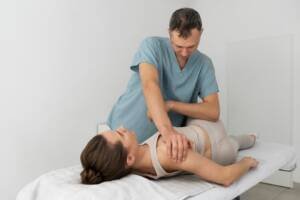Introduction
Equine chiropractic care is an essential aspect of maintaining a horse’s health, performance, and overall well-being. Whether you’re a horse owner, trainer, or rider, finding a skilled “equine chiropractor near me” can be a game-changer in your horse’s care routine. This comprehensive guide explores the world of equine chiropractic, its benefits, and how to find the right practitioner for your horse.
Understanding Equine Chiropractic Care
The Essence of Equine Chiropractic
Equine chiropractic is a specialized field focusing on the diagnosis, treatment, and prevention of musculoskeletal disorders in horses. It involves manual adjustments to the horse’s spine and joints, aiming to restore balance and improve function.
The Importance for Horses
Horses, like humans, can experience joint misalignments and muscle tension. These issues can affect their performance, behavior, and overall health. Chiropractic care offers a non-invasive solution to these problems.
Benefits of Chiropractic Care for Horses
Improved Mobility and Flexibility
Regular chiropractic adjustments can enhance a horse’s range of motion, leading to better mobility and flexibility. This is crucial for performance horses in disciplines like dressage, show jumping, and racing.
Pain Relief and Injury Prevention
Chiropractic care is effective in relieving pain from existing conditions and can play a significant role in injury prevention, particularly in athletic horses.
Enhanced Performance
Proper spinal alignment and muscle balance can significantly improve a horse’s performance, making chiropractic care popular among competitive riders and trainers.
Overall Health and Well-being
Chiropractic care contributes to a horse’s general health by improving nervous system function, which can impact digestion, immunity, and behavior.
Finding the Right Equine Chiropractor
Research and Referrals
Start by searching online for “equine chiropractor near me.” Horse forums, equestrian clubs, and veterinary referrals can also be valuable resources.
Check Qualifications and Experience
Ensure the chiropractor is licensed and has specific training in equine chiropractic. Experience with horses and understanding of equine behavior is crucial.
Consultation and Assessment
A thorough initial assessment of your horse’s health, history, and specific needs is vital. This helps in customizing the treatment plan.
What to Expect from an Equine Chiropractic Session
Initial Evaluation
The chiropractor will observe your horse’s movement, assess its spine and joints, and may ask about its history and any current issues.
The Adjustment Process
Adjustments are usually done by hand and involve specific, controlled forces applied to the horse’s joints.
Aftercare and Recommendations
Post-adjustment, the chiropractor might suggest exercises, changes in training routines, or follow-up sessions.
Tips for Horse Owners
- Observe Your Horse: Be aware of subtle changes in behavior, movement, or performance, as these can indicate the need for chiropractic care.
- Follow the Chiropractor’s Advice: Adhere to any recommendations for exercise, rest, or changes in training.
- Regular Check-ups: Even if your horse seems fine, regular chiropractic check-ups can prevent future issues.
Integrating Chiropractic Care with Veterinary Medicine
Collaborative Approach
The best results often come from a collaborative approach between your veterinarian and chiropractor. They can work together to provide comprehensive care.
Understanding Limitations
Chiropractic care is not a substitute for veterinary medicine but a complementary approach. Some conditions may require medical intervention.
Conclusion
Finding a skilled “equine chiropractor near me” can significantly contribute to your horse’s health, performance, and quality of life. Equine chiropractic care, with its myriad of benefits, is an invaluable investment in the well-being of your equine companion. Always ensure that any chiropractic treatment is part of a broader healthcare plan discussed with your veterinarian.





